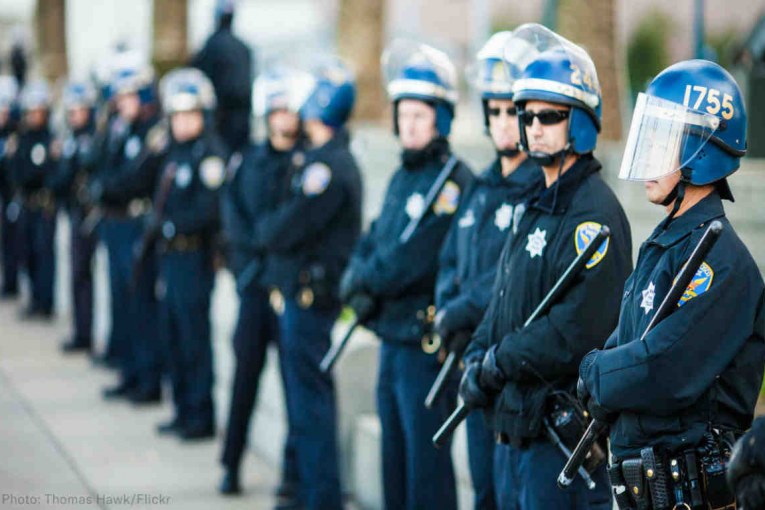

By David M. Greenwald
Sacramento, CA – On Monday, Governor Newsom signed into law AB 127, key legislation that removes barriers to police accountability. The bill was authored by Senator Sydney Kamlager while she was still an Assemblymember, and was cosponsored by San Francisco DA Chesa Boudin.
“This is a really important bill, it’s a technical bill but it really will move the needle with regards to how we keep the system more accountable and transparent and also how we’re able to hold officers involved in officer shootings—how we’re able to hold them accountable,” Senator Kamlager told the Vanguard in a phone interview on Wednesday.
The bill is intended to remove obstacles to prosecutors by making it easier to secure arrest warrants against officers who break the law. Under current law, only peace officers can attest to probable cause in order to an arrest another peace officer.
One obstacle to prosecution of police officers is the frequent unwillingness of law enforcement officers to assist in the prosecution of one of their own.
The law will expand who can attest to probable cause for arrest when the subject of that arrest is a peace officer. This will remove a common barrier to police prosecutions.
“It will help further keep things more transparent, we know that when we see and we hear about officer-involved shootings, it seems like everything is incredible cloaked, it’s hard to get  information, often times it seems like the prosecutors are not able to get an arrest warrant,” Kamlager explained. “This will help and allow prosecutors to go directly to a judge to get an arrest warrant for an officer involved in an officer-involved shooting rather than relying on another peace officer to do that.
information, often times it seems like the prosecutors are not able to get an arrest warrant,” Kamlager explained. “This will help and allow prosecutors to go directly to a judge to get an arrest warrant for an officer involved in an officer-involved shooting rather than relying on another peace officer to do that.
“Very often the blue code is strong enough that it really inhibits (or) discourages peace officers from doing that,” she added.
Her hope is that this is a law that is not used much—as they hope to reduce the number of officer-involved shootings. But this bill creates another pathway to allow investigations and criminal prosecutions to go forward as needed.
There are a number of crucial police reform bills moving their way through the legislature. One of the big ones is SB 2, the Police Decertification Bill authored by Senator Steven Bradford that would allow California to join many other states in being able to decertify police officers and prevent officers who have engaged in misconduct from ever working in the field again.
“My hope is that this will be the first of a number of other bills that deal with police with police accountability that get passed and signed this year,” Kamlager said.
She worries that some will be watered down and get away from the intent of the reforms.
“The intent is how do we create a fairer system that provides justice for everyone and not just for those who have a badge or who have privilege,” she said.
At the same time, she said, “These kinds of bills make some people leery because they can be hard and there’s a lot of pressure to keep things the same and hope that change happens organically.”
This legislation is a small piece of that puzzle and in some ways very technical.
“We have to change the culture, the entire culture, of the system and the departments and you have to change the criteria—what do we want police officers to do,” she said, noting, “We have asked them to do a lot” and have “asked them to do increasingly more things dealing with increasingly complicated social issues.
“I think we have to ask ourselves what do we want police officers to do?” she said. And second she noted, we have to ask, “Who we want our police officers to be?”
She noted that many are fresh out of high school with a GED without a lot of lived experience. Having more diversity, older, and better educated police officers could improve the service provided to the community, she suggested.
Finally, she said, “we need to ask ourselves, what is criminal?
“We seem to want to make everything criminal—that’s why so many bills come before us in public safety, but is that what we should be doing? And is this kind of punishment, the most appropriate?” she added.
The bill was sponsored by San Francisco DA Chesa Boudin. Kamlager previously told the Vanguard that Boudin, shortly after being elected, approached her about making this change, while she was still in the Assembly.
Boudin indicated that it was not a specific issue or incident that triggered his support of this bill. Rather he was looking for a way to remove barriers to the prosecution of problem police officers.
“I am thrilled that Governor Newsom has signed AB 127 into law to ensure that California is eliminating obstacles to police accountability,” Boudin said in a statement.
“The murder of George Floyd and so many others around the state of California and the nation has reminded us of the need to promote justice for victims of police violence and police misconduct,” he added.
“AB 127 remedies the problem that exists when law enforcement officers refuse to assist in the prosecution of a fellow officer—which can leave prosecutors unable to pursue charges against police who break the law.’
Senator Kamlager added in a statement: “We can’t let a ‘snitches get stitches’ policy strong-arm our criminal legal system. AB 127 fights against this practice and will dramatically help in holding police officers accountable in California.”
—David M. Greenwald reporting

